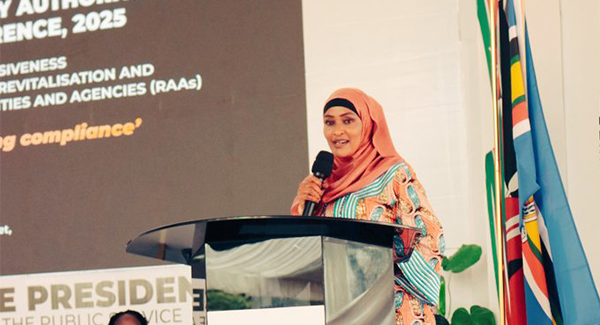STATEMENT DURING THE COMMEMORATION OF THE INTERNATIONAL DAY OF THE GIRL CHILD
The National Gender and Equality Commission joins Kenya and the global community in commemorating the International Day of the Girl Child (IDGC) 2025. Established by United Nations Resolution 66/170, the day is celebrated on 11th day of October to raise awareness about the unique challenges faced by girls, to promote their rights, and to address gender inequalities. The theme for IDGC 2025 is "The girl I am, the change I lead: Girls on the frontlines of crisis ".
Across the globe, girls bear a disproportionate share of the burden during times of crisis. Whether facing conflict, pandemics, economic shocks, or climate disasters, they are more likely to be pulled out of school, forced into early marriage, or exposed to heightened risks of gender-based violence. According to UN Women, crises deepen pre-existing gender inequalities, with adolescent girls among the first to lose access to education and protection services. The World Bank estimates that climate-related shocks alone could push an additional 4 million girls worldwide out of school each year, undermining their lifelong earnings and agency.
Kenya mirrors these global realities. During droughts, floods, and conflict-related displacements, girls often face increased risk of child marriage, exploitation, and gender-based violence. The Kenya Demographic and Health Survey (2022) reports that 23% of Kenyan girls are married before the age of 18, and 15% become mothers in adolescence. These statistics rise sharply in arid and semi-arid counties. Beyond education, girls often bear the invisible cost of crisis: walking long distances for water, missing school due to unsafe sanitation facilities, and being excluded from digital learning opportunities. Despite these challenges, girls are emerging as powerful changemakers organizing community responses, leading peer advocacy, and designing innovative solutions that sustain families and rebuild communities in the wake of adversity.
Kenya has made notable progress in strengthening the legal and policy environment for girls’ protection and empowerment. The Constitution of Kenya (2010) guarantees equality and freedom from discrimination while prohibiting harmful practices such as female genital mutilation and child marriage. The Children Act (2022) mandates access to education, healthcare, and safe shelter for vulnerable children, while the Sexual Offences Act (2006) and Victim Protection Act (2014) provide mechanisms for justice, psychosocial support, and legal redress for survivors of GBV. The Child Protection in Emergencies Guidelines (2023) ensure structured, child-centered responses during crises. The establishment of the Presidential Taskforce on Gender-Based Violence including Femicide demonstrates Kenya’s resolve to strengthen enforcement, review laws, and secure funding for survivor protection. The Commission acknowledges the tireless efforts of organizations, communities, and partners that have created safe spaces, provided psychosocial care, and empowered girls through education and leadership programs. These initiatives have transformed vulnerability into resilience and nurtured a new generation of girls who are reclaiming their voices and shaping Kenya’s social and economic future.
Nevertheless, gaps remain. Implementation and enforcement of laws are uneven. Deeply rooted patriarchal norms, limited awareness of legal rights, and inadequate coordination among institutions continue to expose girls to violence, exploitation, and neglect. Many survivors face stigma, lack access to legal aid, and are unaware of available support services. These realities demand stronger institutional accountability, increased investment, and sustained collaboration across sectors.
As Kenya commemorates this day, the Commission appeals all stakeholders; national and county governments, civil society, faith-based institutions, the private sector, development partners, and communities to renew their collective resolve to protect and empower girls. Specially the Commission recommends the following:
- Strengthen implementation and enforcement existing laws to protect girls from violence, exploitation, and harmful practices, ensuring accountability at all levels.
- Increase investment in girl-centred programs that provide education, health, protection, and psychosocial support, especially in crisis-affected areas.
- Guarantee inclusive and safe education by improving school infrastructure, re-entry for adolescent mothers, and access for girls with disabilities and those in marginalized regions.
- End harmful practices and shift social norms through community engagement and advocacy to eliminate FGM, child marriage, and gender stereotypes.
- Enhance coordination and data systems for effective collaboration, gender-disaggregated reporting, and evidence-based policy.
- Promote girls’ leadership and participation by institutionalizing mentorship and civic programs that amplify girls’ voices in decision-making.
On our part, we reiterate our unwavering commitment to promoting and safeguarding the rights of the girl child in Kenya. We honor the courage, leadership, and resilience of girls who, even in the midst of crisis, continue to drive transformative change in their families, schools, and communities.
Happy International Day of the Girl Child!
Hon. Rehema Jaldesa
Chairperson


Comments